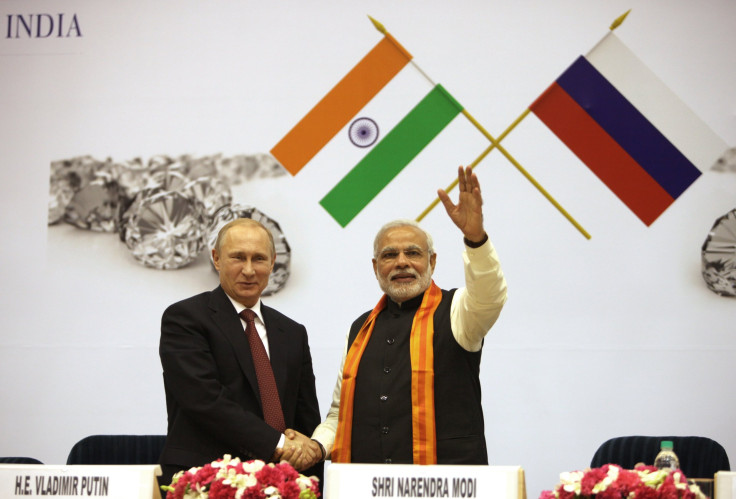Putin Visits India, S-400 Missile Deal Expected To Be Signed

UPDATE: 5.40 a.m. EDT - Russian President Vladimir Putin and Indian Prime Minister Narendra Modi signed a deal for five S-400 missiles. Memorandum of Understandings were signed between the two nations in fields including railways, space and nuclear. In a joint press conference, Modi said "Russia has stood by India through time and has played a crucial role In India's growth story." He added that the two nations have taken some important steps to strengthen the relationship and are also committed to cooperating in the fight against terrorism.
"Russia has committed full support to India's first manned space mission Gaganyaan," Modi added.
Putin said Russia values its ties with India, and places the India relationship as a top priority. He added he has spoken to the Indian PM about the situation in Syria and also discussed the situation that "came as a result of action of U.S. to withdraw from Iran deal."
Addressing a joint press meet with President Putin. Watch. @KremlinRussia_E https://t.co/Ybc7EU67AF
— Narendra Modi (@narendramodi) October 5, 2018
Original story:
Russian President Vladimir Putin landed in New Delhi on Thursday for the annual India-Russia bilateral summit with Indian Prime Minister Narendra Modi. Signing a $5 billion deal to allow India procure S-400, Russia’s most advanced air defense system, remains the key focus of the summit.
Putin was accompanied by Deputy Prime Minister Yuri Borisov, Foreign Minister Sergey Lavrov and Trade and Industry Minister Denis Manturov among others. They were welcomed at the airport by Indian Minister of External Affairs Sushma Swaraj.
Long standing and time-tested friendship.
— Arindam Bagchi (@MEAIndia) October 4, 2018
Upon his arrival in India for the #IndiaRussia Annual Bilateral Summit, @KremlinRussia_E Vladimir Putin was warmly received by EAM @SushmaSwaraj #DruzbaDosti pic.twitter.com/oHEGzF71Aj
Putin directly went to Modi’s residence, where the leaders had a one-on-one meeting. Post the meeting, Modi hosted a private dinner for the delegates. Modi also tweeted pictures of Putin at his residence with the caption “Welcome to India, President Putin. Looking forward to our deliberations, which will further enhance India-Russia friendship.”
#WATCH: Russian President #VladimirPutin meets Prime Minister Narendra Modi in Delhi. He is on a two-day visit to India. pic.twitter.com/HlvfOGsEcQ
— ANI (@ANI) October 4, 2018
Ahead of the visit, Putin's aide Yuri Ushakov had said the two nations are planning to sign more than 20 documents at the end of the summit. This will improve cooperation in key sectors such as defense, space, trade, energy and tourism, among others.
The S-400 is already operational in Russia and under induction in China. If the deal comes through, India will become the third country to have the advanced air defence missile system.
"Each unit will have up to 32 missiles on launchers at any time. It is expected that two units will defend the National Capital Region and another two cover the Mumbai Baroda Industrial corridor,” Air Marshal (retd) Anil Chopra told Financial Express.
However, the deal could violate the sanctions under the Countering America's Adversaries Through Sanctions Act (CAATSA) instituted by the United States Congress. It allows the nation to impose sanctions on countries engaging in military transactions with Russia.
In September, the U.S. slapped financial sanctions on the Chinese military for buying the S-400 and Russian Sukhoi Su-35 fighter jets.
“The administration has indicated that a focus area for the implementation of CAATSA Section 231 is new or qualitative upgrades in capability — including the S-400. We urge all of our allies and partners to forgo transactions with Russia that would trigger sanctions under CAATSA,” a U.S. state department spokesperson said at the time, local daily Hindustan Times reported.
However, despite pressure from the U.S, India said it will go ahead with the acquisition of the missiles from Russia. It also said it will ask Washington for a special waiver from sanctions.
“Negotiation on S-400 air defence systems has been on for a long while and it is at a stage where it can be finalized. We have a big legacy of buying defence equipment from Russia,” Inidan Defence minister Nirmala Sitharaman said.
While Referring to CAATSA, Sitharaman said it was an American law and not a United Nations’ law and that India has conveyed its position on the issue to Washington.
“Our defense relation with Russia has endured several decades and we have conveyed about it to a U.S. Congressional delegation which visited India recently,” she said.
"Indra-2018," the annual tri-service joint military exercise between India and Russia, is also scheduled from Nov. 18-28.
© Copyright IBTimes 2025. All rights reserved.





















